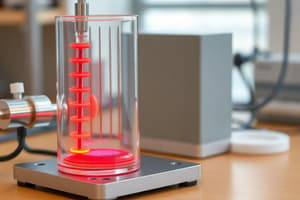Podcast
Questions and Answers
Which statement is correct regarding the specific heat of water and wood?
Which statement is correct regarding the specific heat of water and wood?
- Water will heat up less than wood if the same heat is added. (correct)
- Water will heat up more than wood if the same heat is added.
- Water and wood will heat up equally with the same heat.
- None of the above.
What would be the greatest difference in using an open ceramic coffee mug rather than an insulated mug with a lid as a calorimeter?
What would be the greatest difference in using an open ceramic coffee mug rather than an insulated mug with a lid as a calorimeter?
- Cost.
- Heat capacity.
- Ease of use.
- Exchange of energy with the surroundings. (correct)
The heat capacity of a sample should be divided by which quantity to find the specific heat capacity?
The heat capacity of a sample should be divided by which quantity to find the specific heat capacity?
- Mass in grams. (correct)
- Density.
- Volume in liters.
- Temperature change.
How much heat is given off in the reaction when 40.0 mL of 1.00 M H2SO4 is added to 80.0 mL of 1.00 M NaOH?
How much heat is given off in the reaction when 40.0 mL of 1.00 M H2SO4 is added to 80.0 mL of 1.00 M NaOH?
Why is specific heat capacity often more useful than heat capacity for comparing materials?
Why is specific heat capacity often more useful than heat capacity for comparing materials?
Which units express specific heat capacity?
Which units express specific heat capacity?
How much heat is absorbed by the reaction in a bomb calorimeter that decreases the temperature from 28.50°C to 27.45°C?
How much heat is absorbed by the reaction in a bomb calorimeter that decreases the temperature from 28.50°C to 27.45°C?
What defines a calorimeter?
What defines a calorimeter?
If a bomb calorimeter releases 24.0 kJ of heat, what is its final temperature if the initial temperature is 25.5°C?
If a bomb calorimeter releases 24.0 kJ of heat, what is its final temperature if the initial temperature is 25.5°C?
How does a basic coffee cup calorimeter work?
How does a basic coffee cup calorimeter work?
Flashcards are hidden until you start studying
Study Notes
Specific Heat and Heat Capacity
- Specific heat of water: 4.18 J/(g·°C); wood: 1.97 J/(g·°C).
- With equal masses, water heats up less than wood when the same heat is added.
- Specific heat capacity is more useful than heat capacity because it is an intensive property, not dependent on sample size.
Calorimetry Concepts
- Calorimeters measure heat changes during chemical reactions.
- An open ceramic mug allows energy exchange with surroundings, unlike an insulated mug with a lid.
- Heat capacity of a sample divided by mass in grams gives specific heat capacity.
Heat Transfer Calculations
- When mixing 40.0 mL of 1.00 M H2SO4 with 80.0 mL of 1.00 M NaOH, the solution's temperature increases to 29.20°C; heat released is 4.62 kJ.
- A bomb calorimeter that starts at 28.50°C and cools to 27.45°C, absorbing heat, indicates 5,170 J of heat absorbed.
- Complete combustion of 0.600 g of a compound releases 24.0 kJ; final temperature of a 1.30 kg calorimeter initially at 25.5°C rises to 30.9°C.
Measurement Units
- Specific heat capacity is expressed in J/(g·°C), J/(g·K), cal/(g·°C), cal/(g·K).
Functionality of Calorimeters
- A basic coffee cup calorimeter uses the mass and specific heat of water and a thermometer to measure energy changes when substances are added.
Studying That Suits You
Use AI to generate personalized quizzes and flashcards to suit your learning preferences.




